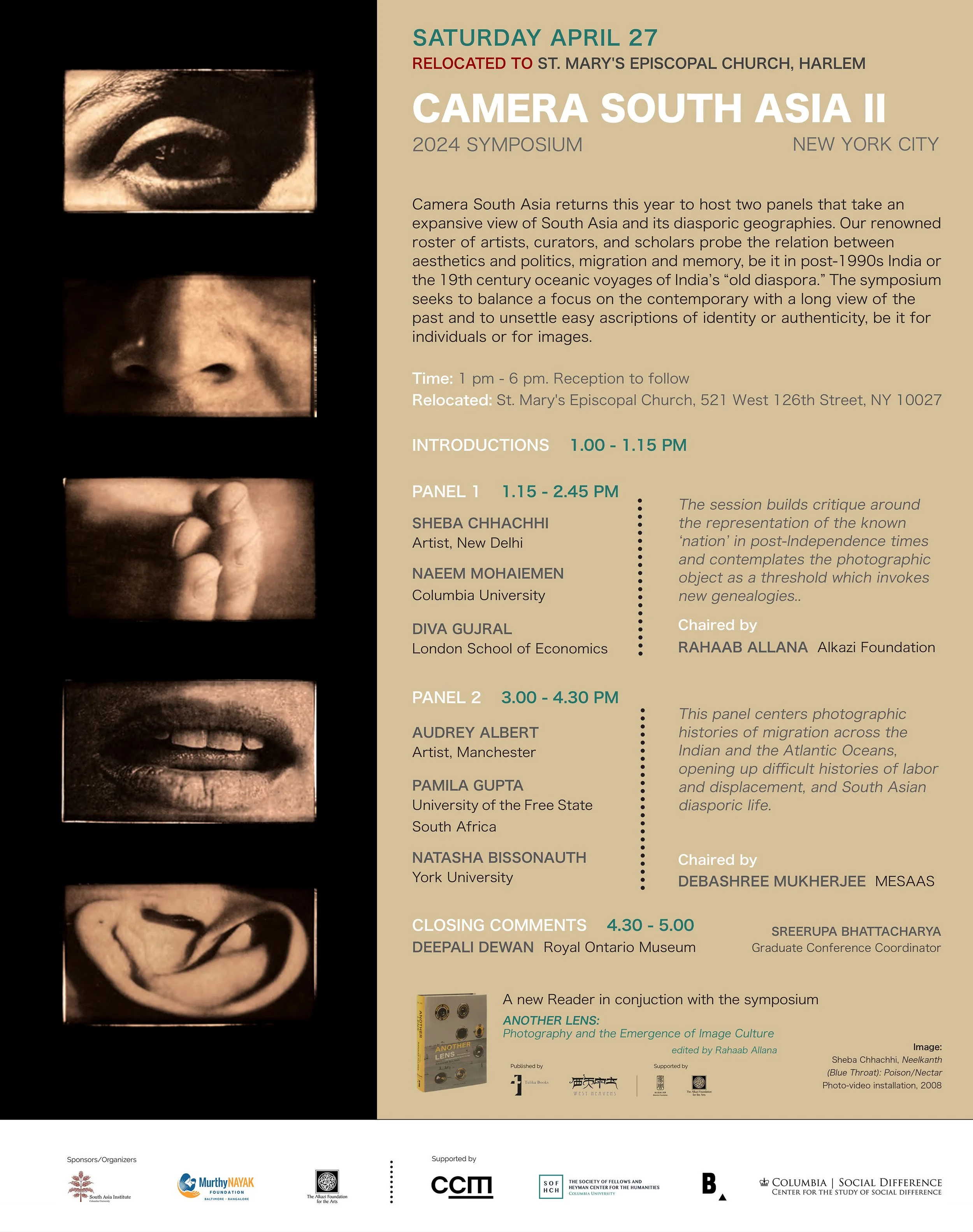The Extractive Media Working Group at CSSD will be co-sponsoring Camera South Asia II alongside the South Asia Institute as they return this year to host a conversation that takes an expansive view of South Asia and its diasporic geographies. Our renowned roster artists, curators, and scholars probe the relation between aesthetics and politics, migration and memory, be it in post-1990s India or the 19th century oceanic voyages of the subcontinent’s “old diaspora.” Camera South Asia seeks to balance a focus on the contemporary with a long view of the past and to unsettle easy ascriptions of identity or authenticity, be it for individuals or for images.
When: Saturday, April 27
1 PM - 6 PM EDT
Where: St Mary's Episcopal Church in Harlem
SCHEDULE
1-1.15pm: Introductions
ANOTHER LENS
Panel 1: 1.15 - 2.45 pm
Moderated by Rahaab Allana (Alkazi Foundation)
The panel draws upon the scholarship of a newly published reader titled Another Lens (ed. Rahaab Allana; published by Tulika and Westheavens), as part of a series called India Since the 90s. The book and this associated panel reframe lens-based practice in India through a fresh historical perspective. The panel hopes to narrate key aspects of the transformation and redefinition of photography in the 1990s – the decade marked by economic liberalization, globalization and the embedment of digital technology that revolutionized the media sphere. The contributors critically examine normative paradigms of image production, exhibition and circulation in the areas of documentary and fine art photography, journalism, cinema, contemporary arts and the archive. They also delineate new publics, emergent patterns of viewership, shifting modes of media consumption, and the diverse, technologically enabled creative trajectories that inscribe the postcolonial imaginary within the wider orbit of South Asian image cultures.
“‘Oh what a blow that phantom gave me!’”
Sheba Chhachhi (Artist, New Delhi) via ZOOM
“Camera Silence: Harmit Singh’s War”
Naeem Mohaiemen (Columbia University)
“Photography, Nation and Narration: Thinking between the 1950s and 1970s”
Diva Gujral (London School of Economics)
Tea: 2.45 - 3.00 pm
ACROSS OCEANS
Panel 2: 3.00 - 4.30 pm
Moderated by Debashree Mukherjee (MESAAS)
The contours of South Asia go far beyond territorial and national boundaries, or Cold War-era geopolitical divisions. South Asia extends into all the diasporic spaces made by workers, traders, teachers, and artists who moved out of the Indian subcontinent by choice or by necessity. This panel centers photographic histories of migration across the Indian and the Atlantic Oceans from the late 19th century to the present. Our speakers open up difficult histories of indentured labor in the Caribbean, forced displacement in the Chagos Archipelago, and diasporic photo-entrepreneurship on the Swahili coast to initiate an important conversation in the United States on the vexed and multiple trajectories of South Asian diasporic life. Through these papers, photography announces itself as simultaneously a form of biometric surveillance, aspirational self-making, and a multi-generational site of healing.
“Matter Out of Place”
Audrey Albert (Artist, Manchester)
“Looking for, Listening to ‘Crowds’ in the Capital Art Studio Collection (Zanzibar)”
Pamila Gupta (University of the Free State, South Africa)
“Renluka Maharaj’s Coolie Iconoclasm”
Natasha Bissonauth (York University)
Closing Remarks: 4.30PM
Further resources & links:
The recent declaration by the Barnard and Columbia Chapters of the American Association of University Professors (AAUP)
The demands for boycott from the Faculty and Staff for Justice in Palestine at Barnard and Columbia.
St Mary's Episcopal Church of Harlem is ten blocks from the Morningside (main) campus, and one block from the Manhattanville campus. They have a history of providing sanctuary for undocumented youth, LGBTQ youth, and opposing the gentrification of Harlem. The priest is Reverend Dr. Mary Foulke, an abolitionist. Here is an interview with her: “[W]e’ve asked you for help, and you gave us a raid.”

